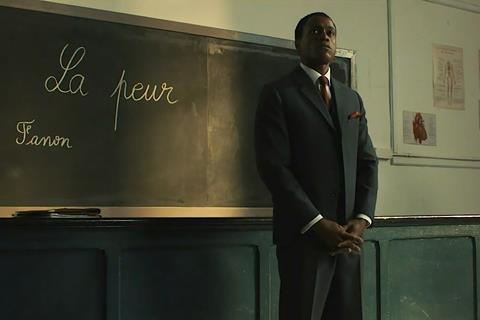French psychiatrist Frantz Fanon, and the formative years he spent in 1950s Algeria

Dir: Jean-Claude Barny. France/Luxembourg/Canada 2024. 133mins
French psychiatrist Frantz Fanon crystallised thinking about the way colonialism flourishes by dehumanising the oppressed, and Fanon dramatises a formative period in the 1950s that he spent in Algeria. The way in which his political thinking was sharpened by personal experience makes for an absorbing drama that should appeal to arthouse audiences and provide a primer to Fanon in the run-up to the centenary of his birth in 2025.
A compelling glimpse into the moments that shaped Fanon’s life
When Martinique-born Fanon (Alexandre Bouyer) arrives in Algeria in 1953, he has the look of a saintly Sidney Poitier character from a 1960s movie. Handsome, well-mannered and impeccably dressed, he exudes confidence – but is assumed to be a servant carrying the bags of his white wife Josie (Deborah Francois). The hostility to a young Black professional continues when he takes up his new position as division director of the Blida Joinville Psychiatric Hospital. His boss Darmain (a smug, silky Olivier Gourmet) seems mildly amused by all of Fanon’s newfangled ideas.
It quickly becomes apparent that the racism he encounters isn’t personal but systemic. The Algerian residents of Blida Joinville are shackled, kept in straitjackets, confined to a gloomy room and only permitted a daylight stroll as a reward for good behaviour. Water is rationed on even the hottest days so they don’t throw urine at the staff. Fanon literally leads people from the darkness into the light, opening up windows, improving facilities and treating everyone as an equal.
Fanon’s influence on cinema has been felt down the decades, notably in Pontecorvo’s The Battle Of Algiers (1965) and Isaac Julien’s documentary Frantz Fanon: Black Skin, White Masks (1985). There is a slightly muted, old-fashioned air to Jean-Claude Barny’s take on the man that is not unappealing. The dramatic cliche of a heroic individual challenging conventions gradually expands to offer a sense of how French colonial rule operated in Algeria and the way it brutalised both oppressed and oppressor. French army sergeant Rolland (Stanislas Merhar) is notable for the savage way he maintains order and secures confessions, and yet he too emerges as a victim of the state.
Fanon builds a political philosophy, dictating a series of observations to his supportive wife Josie – who is often sidelined during the story. The little information that we do glean about her suggests there could easily have been an entire film devoted to Josie’s life. Fanon comes to believe that if people are treated like animals they have every justification for taking up arms against their oppressors. His sympathy for the Algerians and their cause means that compassion inevitably spills over into action.
You assume the budget dictated how director Jean-Claude Barny approached the depiction of Algeria in the 1950s; the film often seems as spare and understated as its central character. Walls strewn with slogans, a grenade attack or a vicious reprisal convey the ongoing turmoil. Ariel Methot’s sun-bleached cinematography emphasises a land whose beauty is at odds with the cruelty imposed on its citizens. There is enough texture of oppression and acts of rebellion to still build suspense over what Fanon may do and the consequences for himself and his family.
Filled with mounting tension and moral dilemmas, Fanon builds into a compelling glimpse into the moments that shaped Fanon’s life and it might well sit comfortably in a double-bill with 2024’s other Fanon film from Algerian director Abdenour Zahzah: True Chronicles Of The Blida Joinville Psychiatric Hospital In The Last Century, When Dr Frantz Fanon Was Head Of The Fifth Ward Between 1953 And 1956.
Production companies: Special Touch Studios, Webspider, Peripheria, Paul Thiltges Distributions.
International sales: Special Touch Studios contact@specialtouchstudios.com
Producers: Sebastien Onomo, Louise Genis-Cosserat, Adrien Chef, Paul Thiltges, Yanick Letourneau.
Screenplay: Philippe Bernard, Jean-Claude Barny
Cinematography: Ariel Methot
Production design: Audrey Hernu
Editing: Maxime Lahaye
Music: Thibault Kientz Agyeman, Ludovic Louis
Main cast: Alexandre Bouyer, Deborah Francois, Olivier Gourmet, Stanislas Merhar







![The Brightest SunScreen[Courtesy HKIFF]](https://d1nslcd7m2225b.cloudfront.net/Pictures/274x183/3/5/0/1448350_thebrightestsunscreencourtesyhkiff_312678.jpg)














![The Brightest SunScreen[Courtesy HKIFF]](https://d1nslcd7m2225b.cloudfront.net/Pictures/100x67/3/5/0/1448350_thebrightestsunscreencourtesyhkiff_312678.jpg)

